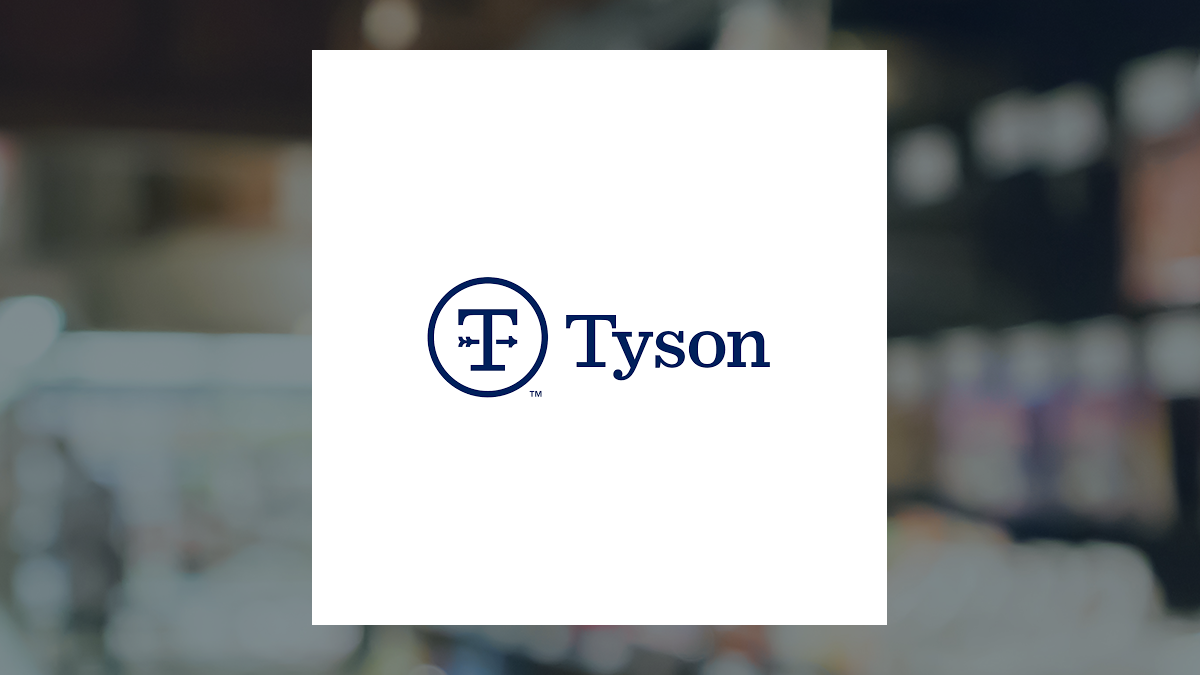JBS (OTCMKTS:JBSAY – Get Free Report) and Tyson Foods (NYSE:TSN – Get Free Report) are both large-cap consumer staples companies, but which is the better business? We will compare the two businesses based on the strength of their risk, analyst recommendations, earnings, dividends, profitability, institutional ownership and valuation.
Profitability
This table compares JBS and Tyson Foods’ net margins, return on equity and return on assets.
| Net Margins | Return on Equity | Return on Assets | |
| JBS | 2.65% | 25.55% | 5.33% |
| Tyson Foods | 1.45% | 7.49% | 3.77% |
Earnings and Valuation
This table compares JBS and Tyson Foods”s gross revenue, earnings per share and valuation.
| Gross Revenue | Price/Sales Ratio | Net Income | Earnings Per Share | Price/Earnings Ratio | |
| JBS | $77.18 billion | 0.21 | $1.77 billion | $1.76 | 8.20 |
| Tyson Foods | $53.31 billion | 0.38 | $800.00 million | $2.20 | 25.82 |
JBS has higher revenue and earnings than Tyson Foods. JBS is trading at a lower price-to-earnings ratio than Tyson Foods, indicating that it is currently the more affordable of the two stocks.
Analyst Ratings
This is a summary of recent recommendations and price targets for JBS and Tyson Foods, as provided by MarketBeat.com.
| Sell Ratings | Hold Ratings | Buy Ratings | Strong Buy Ratings | Rating Score | |
| JBS | 0 | 0 | 2 | 1 | 3.33 |
| Tyson Foods | 0 | 12 | 2 | 0 | 2.14 |
Tyson Foods has a consensus price target of $61.3333, indicating a potential upside of 7.96%. Given Tyson Foods’ higher possible upside, analysts plainly believe Tyson Foods is more favorable than JBS.
Risk & Volatility
JBS has a beta of 0.79, suggesting that its share price is 21% less volatile than the S&P 500. Comparatively, Tyson Foods has a beta of 0.59, suggesting that its share price is 41% less volatile than the S&P 500.
Dividends
JBS pays an annual dividend of $2.08 per share and has a dividend yield of 14.4%. Tyson Foods pays an annual dividend of $2.00 per share and has a dividend yield of 3.5%. JBS pays out 118.2% of its earnings in the form of a dividend, suggesting it may not have sufficient earnings to cover its dividend payment in the future. Tyson Foods pays out 90.9% of its earnings in the form of a dividend, suggesting it may not have sufficient earnings to cover its dividend payment in the future. Tyson Foods has raised its dividend for 13 consecutive years.
Institutional and Insider Ownership
0.1% of JBS shares are owned by institutional investors. Comparatively, 67.0% of Tyson Foods shares are owned by institutional investors. 2.0% of Tyson Foods shares are owned by company insiders. Strong institutional ownership is an indication that large money managers, endowments and hedge funds believe a stock will outperform the market over the long term.
Summary
JBS beats Tyson Foods on 9 of the 17 factors compared between the two stocks.
About JBS
 JBS S.A., together with its subsidiaries, engages in the processing of animal protein worldwide. The company trades in beef, pork, chicken, poultry, fish, and lamb products; cooked frozen meat; plant based products; and other food products. It produces and commercializes leather, steel cans, plastic resin, personal care and cleaning products, and collagen, as well as wet blue leather, semi-finished, and finished leather products. In addition, it is involved in transportation, cold storage, industrial waste management solutions, recycling, and produces and commercializes electric power. Further, the company engages in the production and commercialization of raw ham and cooked ham; purchases and sells soybeans, tallow, palm oil, and caustic soda; and operates distribution centers and harbors. Additionally, it produces beef jerky; offers cattle fattening and warehousing services; operates logistics; and trades in by products from processing. The company was formerly known as Friboi Ltda. JBS S.A. was founded in 1953 and is headquartered in São Paulo, Brazil.
JBS S.A., together with its subsidiaries, engages in the processing of animal protein worldwide. The company trades in beef, pork, chicken, poultry, fish, and lamb products; cooked frozen meat; plant based products; and other food products. It produces and commercializes leather, steel cans, plastic resin, personal care and cleaning products, and collagen, as well as wet blue leather, semi-finished, and finished leather products. In addition, it is involved in transportation, cold storage, industrial waste management solutions, recycling, and produces and commercializes electric power. Further, the company engages in the production and commercialization of raw ham and cooked ham; purchases and sells soybeans, tallow, palm oil, and caustic soda; and operates distribution centers and harbors. Additionally, it produces beef jerky; offers cattle fattening and warehousing services; operates logistics; and trades in by products from processing. The company was formerly known as Friboi Ltda. JBS S.A. was founded in 1953 and is headquartered in São Paulo, Brazil.
About Tyson Foods
 Tyson Foods, Inc., together with its subsidiaries, operates as a food company worldwide. It operates through four segments: Beef, Pork, Chicken, and Prepared Foods. The company processes live fed cattle and hogs; fabricates dressed beef and pork carcasses into primal and sub-primal meat cuts, as well as case ready beef and pork, and fully cooked meats; raises and processes chickens into fresh, frozen, and value-added chicken products, including breaded chicken strips, nuggets, patties, and other ready-to-fix or fully cooked chicken parts; and supplies poultry breeding stock. It also manufactures and markets frozen and refrigerated food products, including ready-to-eat sandwiches, flame-grilled hamburgers, Philly steaks, pepperoni, bacon, breakfast sausage, turkey, lunchmeat, hot dogs, flour and corn tortilla products, appetizers, snacks, prepared meals, ethnic foods, side dishes, meat dishes, breadsticks, and processed meats under the Tyson, Jimmy Dean, Hillshire Farm, Ball Park, Wright, Aidells, ibp, and State Fair brands. The company sells its products through its sales staff to grocery retailers, grocery wholesalers, meat distributors, warehouse club stores, military commissaries, industrial food processing companies, chain restaurants or their distributors, live markets, international export companies, and domestic distributors who serve restaurants and food service operations, such as plant and school cafeterias, convenience stores, hospitals, and other vendors, as well as through independent brokers and trading companies. The company was founded in 1935 and is headquartered in Springdale, Arkansas.
Tyson Foods, Inc., together with its subsidiaries, operates as a food company worldwide. It operates through four segments: Beef, Pork, Chicken, and Prepared Foods. The company processes live fed cattle and hogs; fabricates dressed beef and pork carcasses into primal and sub-primal meat cuts, as well as case ready beef and pork, and fully cooked meats; raises and processes chickens into fresh, frozen, and value-added chicken products, including breaded chicken strips, nuggets, patties, and other ready-to-fix or fully cooked chicken parts; and supplies poultry breeding stock. It also manufactures and markets frozen and refrigerated food products, including ready-to-eat sandwiches, flame-grilled hamburgers, Philly steaks, pepperoni, bacon, breakfast sausage, turkey, lunchmeat, hot dogs, flour and corn tortilla products, appetizers, snacks, prepared meals, ethnic foods, side dishes, meat dishes, breadsticks, and processed meats under the Tyson, Jimmy Dean, Hillshire Farm, Ball Park, Wright, Aidells, ibp, and State Fair brands. The company sells its products through its sales staff to grocery retailers, grocery wholesalers, meat distributors, warehouse club stores, military commissaries, industrial food processing companies, chain restaurants or their distributors, live markets, international export companies, and domestic distributors who serve restaurants and food service operations, such as plant and school cafeterias, convenience stores, hospitals, and other vendors, as well as through independent brokers and trading companies. The company was founded in 1935 and is headquartered in Springdale, Arkansas.
Receive News & Ratings for JBS Daily - Enter your email address below to receive a concise daily summary of the latest news and analysts' ratings for JBS and related companies with MarketBeat.com's FREE daily email newsletter.
